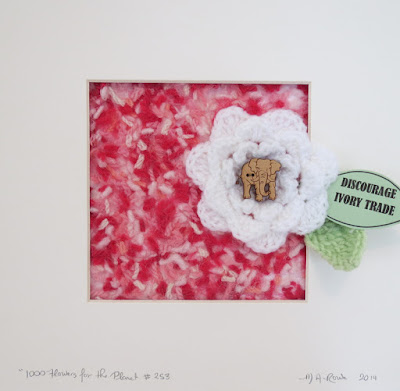1000 Flowers for the Planet art installation, Manningham Gallery, Doncaster, Melbourne, Australia, 2014
by Margaret A. Rowe (part installation of 400 flowers), 1.2 x 3m
www.margaretrowe.com.au
To those who have been following the flowers here, thank you so much for your support and I hope you'll continue checking out ways to help make this planet a better place to live by going to the above website. There, you will also be able to see my books and art. Some of my art is specifically connected to the 1000 Flowers for the Planet art project, others are inspired by various environmental issues. I call myself a 'conscience artist' - one who reveals right from wrong in this world in which we live. I hope you'll stick with me.
Meanwhile, here are some more images of my art for your enjoyment.
Thank you.
Images Eleven, 30 x 30cm, 2014, Margaret A. Rowe
hand painted silk, seed stitch, beads, found objects
Images Five, 30 x 30cm, 2015, Margaret A. Rowe
hand painted silk, seed stitch, beads, found objects
Images Four, 30 x 30cm, 2015, Margaret A. Rowe
hand painted silk, seed stitch, beads, found objects
1000 Flowers for the Planet #101 Own Fewer Clothes, 30 x 30cm, 2014, Margaret A. Rowe
hand painted silk, wool, beads, paper, found objects
1000 Flowers for the Planet #253 Discourage Ivory Trade, 25 x 25cm, 2013, Margaret A. Rowe
wool, paper, wood


































